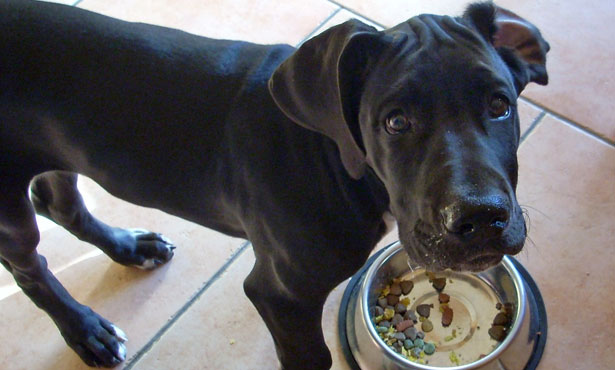The Free of Grain but Broken-Hearted
There are very few variables in caring for your dog that are more controllable and personal than the diet you chose for him or her. This general topic evokes very heated emotions, and there are (figuratively) billions of topics to address as subsets of diet-related controversies. For now, though, I want to write about the latest developments in grain-free food and the load of information leaking out on the Internet about its correlation with heart-related canine disease. It’s, yet again, another light and breezy summer post with which to cozy up next to your loved ones.
Here’s the Breakdown
A recent well-respected study showed a fairly well-correlated link between heart disease (dilated cardiomyopathy, or DCM) and grain-free diets, especially in breeds at higher risks, such as golden retrievers, Doberman pinschers, boxers, Irish wolfhounds, and Great Danes. There is not yet a clear understanding as to why this is the case, but the correlation is clear enough that cardiologists are steering their patients away from grain-free diets.
Some have speculated that the grain-free diets have insufficient taurine levels causing a taurine deficiency, a known cause of DCM, but even that is unclear. A few specific brands were mentioned in these studies, but the only clear commonality is that they were grain-free and legume-based (a plant that is part of the pea-family: alfalfa, clover, peas, beans, chickpeas, lentils, etc.).
On August 10, the United States Food and Drug Administration issued a statement regarding its investigation into this matter.
For Now:
First, do not panic.
If you have your dog on a grain-free diet, the safest and easiest thing to do is to stop that diet and go back to the debauchery of the pre-grain-free days of dog food. Given that there still is not much evidence of the benefits of going grain-free, the risks outweigh the supposed benefits for now. The veterinary community is working with the FDA to figure out the problem, so we may get answers soon, but until then: Well, I would switch. I am switching, literally, right now, for my dog. Most effects of taurine deficiency (and thus the correlative effects of a grain-free diet) are reversed when the diet is changed back and the deficiency is reversed.
If you have a reason to continue feeding a grain-free diet, please feel free to discuss it with us. Make an appointment and we will go over this with you. Then, we can refer you to a cardiologist for an echocardiogram to make sure there is not already an issue, and we can sample taurine levels and, if they are problematic, give taurine supplementation. We can also just start to supplement with taurine, which is fairly inexpensive. The only thing to remember is that we still are not sure if the taurine is the actual problem, so you would be taking some risks.
Because I Know You (Yes, YOU!) Are Going to Ask…
- There is a bit of a grain-free myth out there. Food allergies are fairly uncommon, and allergies to grain are even more uncommon within the subset of rare allergies. You can find accusations of grain causing cancer, still births, arthritis, the multitude and intensity of flatulence, and just about anything else. There is, as of yet, no clear correlation with grain and anything bad. I know people who swear that their dog stopped having all clinical signs of [ anything ] after going on a grain-free diet, and I believe them, but I also may put factors in the mix other than the grain. I know dogs in the wild do not eat grain, but they also do not sleep in temperature-controlled waterbeds wearing footsie pajamas.
- I hear many people discuss how they do not trust the big pet food companies. Usually the words, “cancer” and “conspiracy” are thrown out as a consequence of using their products.
I am not asking you to support Exxon brand dog treats, but I also suggest that you think about how much testing of nutritional adequacy is done with companies that can afford to do such, versus some companies that cannot. I am absolutely not suggesting that all smaller dog food brands are bad, or not to be trusted, but the foods most implicated in these studies were all made by smaller companies without a long track record of maintaining proper nutritional control over their foods. So maybe until we know the cause of this problem, you may want to stick with a brand of food that addresses this specific problem on their website or in person. If they have no answer, then maybe take a break in your relationship and go to a brand that does. The Tufts Veterinary Clinical Nutritional service lists nine questions you should be asking of the companies that make your dog’s food.
- I have had numerous emails about this topic over the last few months, and I have somewhat answered most of them with a “let’s wait and see.” So the “wait and see” is over. If I told you something different before this blog, my new answer is: Switch food.
- There has been absolutely no indication that grain-free cat food is causing a problem. This may be because taurine is such a classically known issue with cats that companies are much more “on-the-ball” in regard to taurine in cat food.
So that is it. I expect to hear from all of you in the next hour. Enjoy the end of summer. Be slightly less than all your energy demands.
Brett Grossman, DVM
Medical District Veterinary Clinic

